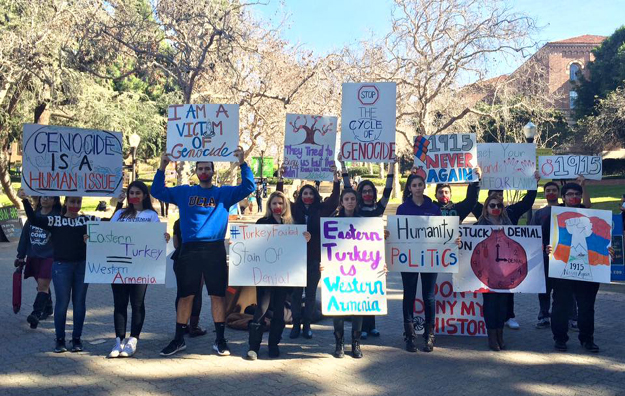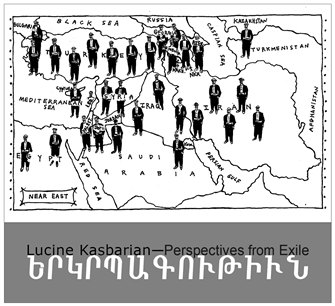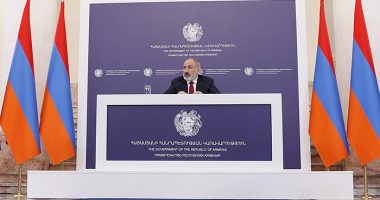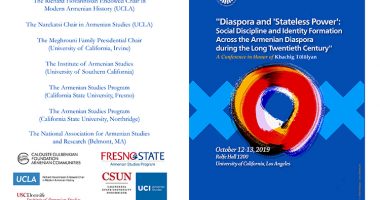LOS ANGELES — On Thursday, February 4th, the All-Armenian Student Association (All-ASA) coordinated the annual “Stain of Denial” silent protest against the continuous denial of the Armenian Genocide. The protests were simultaneously held by ASA chapters and affiliated organizations on their respective college and university campuses. “Stain of Denial” was initiated in 2011 as a silent protest in order to raise awareness of the ongoing denial of the Armenian Genocide and the need for recognition and reparations.
The students, faculty, and community members who participated on Thursday stressed that the Armenian Genocide is not an issue only reserved for the month of April, but it has a profound effect on Armenians every day. Whereas April 24th is traditionally the day that the world commemorates the Armenian Genocide, the memory of the genocide and its ensuing denial continues to be a daily struggle. The All-ASA prioritizes this campaign because Armenian students in college, where the free interchange of ideas and perspectives is encouraged, continuously find that the denial of their history is an injustice that they are blatantly faced with.
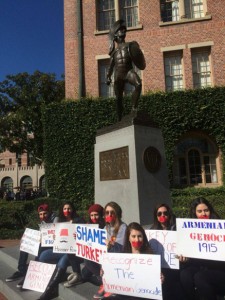

Mikael Matossian, current chair of the All-ASA, stated that “the national protest this year had three main areas of focus: educating students about the history of the genocide, raising awareness about consequences of the genocide and inspiring students to take action against genocide denial by taking action through student government.” Matossian stated that “we made a push for consistent messaging based on those three aforementioned points across the board. We wanted to have a strong collective voice that is visible both in-person and social media, showing that students across the nation are united in their condemnation of genocide denial.”
The participating schools in this year’s “Stain of Denial” protests were: Cal Poly Pomona, Cal State Los Angeles, Cal State Northridge, the Claremont Colleges, Glendale Community College, Los Angeles Valley College, Occidental College, Pasadena City College, Santa Monica College, UC Los Angeles, UC Irvine, UC Riverside, UC San Diego, UC Santa Barbara, UC Santa Cruz, University of Southern California, Tufts University, Grand Valley State University, and Northeastern University.
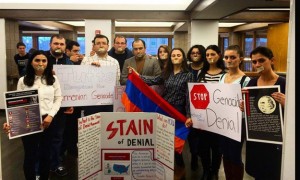

For the first time since its initiation, the silent protests reached across the nation and included active participation from students outside of California. Armenian students at Northeastern and Tufts Universities located in Boston, Massachusetts and Grand Valley State University in Allendale, Michigan participated in the protests. At Tufts University, around 50 Armenian students, faculty, and community members gathered, including 15 Tavitian Scholars from the Republic of Armenia who are studying at the Fletcher School of Law and Diplomacy. Shant Maroukhian, a Tufts Armenian Club member, stated that “Denial is the final step of genocide. This [protest] is the first step of bringing those that are responsible to justice because a lot of people aren’t aware.”
While the overlying theme of the protest is silence, symbolized by the protestors covering their mouths with tape to raise awareness of the continuous silence that the issue has been accorded, some students decided to implement the protest in the manner best fit for their campus community. At Tufts, only one student was silent and wore tape across the mouth, while the others were actively speaking with passerby. At UC San Diego, students gathered around an aptly named “Silent Tree” that is located in the middle of campus and sat in silence for several hours.
Colleges and universities with smaller ASAs decided to join forces: for example, students from Occidental College, Glendale Community College, and Los Angeles Valley College held a joint silent protest. At UC Santa Cruz, the ASA maintained a constant presence at the on-campus Quarry Plaza. Maral Tatoian, current president of the UCSC ASA, stated that “even though our ASA is not as large as other ASAs, it is still important to us to fight for recognition of the genocide. By doing this we hope that the student body at UC Santa Cruz will learn more about Armenians and help us fight for our cause. Many students stopped and either read the signs or talked to one of our members about the meaning behind Stain of Denial. I’m so happy to have watched UCSC’s ASA grow over the past four years and hope that it continues to grow.”
Regardless of the method, thousands of Armenian students, community members, and faculty, both Armenian and non-Armenian, took a stand and reiterated that the Armenian Genocide is not just a “day in April,” but a year-round struggle for justice.
The campaign also included an online component, as those who were not able to attend raised awareness through social media, by incorporating the hashtags #StainofDenial, #ArmenianGenocide, and #DivestTurkey into their online posts. While the protests highlighted the history of the Armenian Genocide and the consequences that still continue, it also raised awareness of the #DivestTurkey initiative. This included education about resolutions that ASAs have passed through their student government councils, including both Armenian Genocide recognition and divestment bills, the latter of which targets over $70 million of University of California funds allocated toward the Turkish government.

